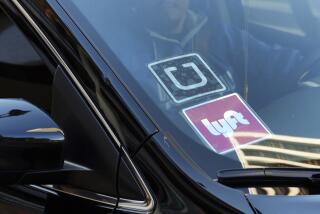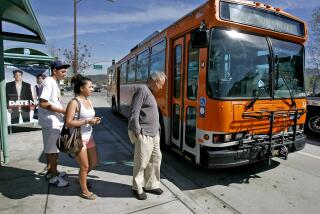Seoul to bring back women-only subway cars
Reporting from Seoul â Hong Ji-min cannot forget that crowded, morning rush-hour commute when she felt someone groping her.
âI knew that someone did it on purpose, but it had happened so fast,â the 25-year-old nurse recalled. âI couldnât do anything but look around with angry eyes. But there was no way I could identify the person in that sea of people.â
Seoul city officials now may have a solution for victimized female commuters: women-only subway cars.
South Korean officials next month will begin a program offering the exclusive train coaches, reviving an idea that was abandoned two decades ago. Reaction to the plan has been so mixed, however, that the city is going to test those cars only late at night to see how it goes.
Seoulâs vast subway network carries 6.4 million passengers daily. And although the rail cars are generally crowded, the morning and evening commutes are notorious, called a âhell rideâ by many because it is a clammy, claustrophobic ordeal.
During rush hour, an increasing number of female passengers have been the target of groping and other sexual crimes. The number of such offenses skyrocketed nearly 80% between 2009 and 2010, to 1,192 cases from 671, according to transportation officials. This year, 600 cases have been reported through the end of July.
The assaults have resulted in women demanding to know what the government is going to do.
Crowded Asian neighbors such as Japan, India, Taiwan and Indonesia operate women-only subway cars â to mixed reviews. In Japan, for instance, such subway cars began running in 2000 but have not resulted in a significant decrease in sexual offenses, officials say.
In 1992, South Korea briefly ran women-only subway cars during rush hour but eventually discontinued the program after male passengers began disregarding the rules and boarded the exclusive cars.
This time around will be different, say transportation officials, who plan to start with two women-only cars after 11:30 p.m. on one of the nine subway lines. A security guard will also be posted aboard to make sure male commuters donât flout the ban.
Some women are also more vulnerable in the later hours after they have been drinking, said Shin Man-cheol, a Seoul metropolitan transportation official. âWeâre hoping that this will reduce sexual crimes at night,â he said.
Activists have mixed reactions to the cityâs plan for separate cars for women.
âWe believe that separating women and men wonât solve the fundamentals of the problem,â said Lee Seon-mi of the Korea Sexual Violence Relief Center. âTo really tackle the problem, you need to understand the crimes. General education is more important.â
In a recent survey of 3,000 male and female subway riders, 55% agreed with the idea of female-only cars, while 45% disagreed. Many women welcomed the idea, but others doubted the effectiveness of the new policy.
âWhen itâs crowded, I always have felt uncomfortable to brush against strangers, although I know people donât do it intentionally,â said Kim Eun-hye, a 24-year-old office worker. âAt least this might solve that problem at late hours.â
But another passenger worried that deviants will now know where to find female subway victims. âI will use it when Iâm coming back home really late,â said Byeon Sun-young, a 29-year-old teacher. âBut Iâll be afraid that in the future there will be criminals specifically targeting the female-only cars at the late hours.â
Hong, the nurse, believes that female passengers who donât take the women-only cars might be seen as setting themselves up for abuse.
âWould the women be criticized if they are harassed while not riding the women-only cars then?â she asked.
Male commuters are also knocking the concept.
âI think it is outrageous to have female-only cars,â posted one male Internet user. âHow about the elderly and families with young kids? How about male-only cars? What would be the limit?â
Choi works in The Timesâ Seoul bureau.
More to Read
Sign up for Essential California
The most important California stories and recommendations in your inbox every morning.
You may occasionally receive promotional content from the Los Angeles Times.










